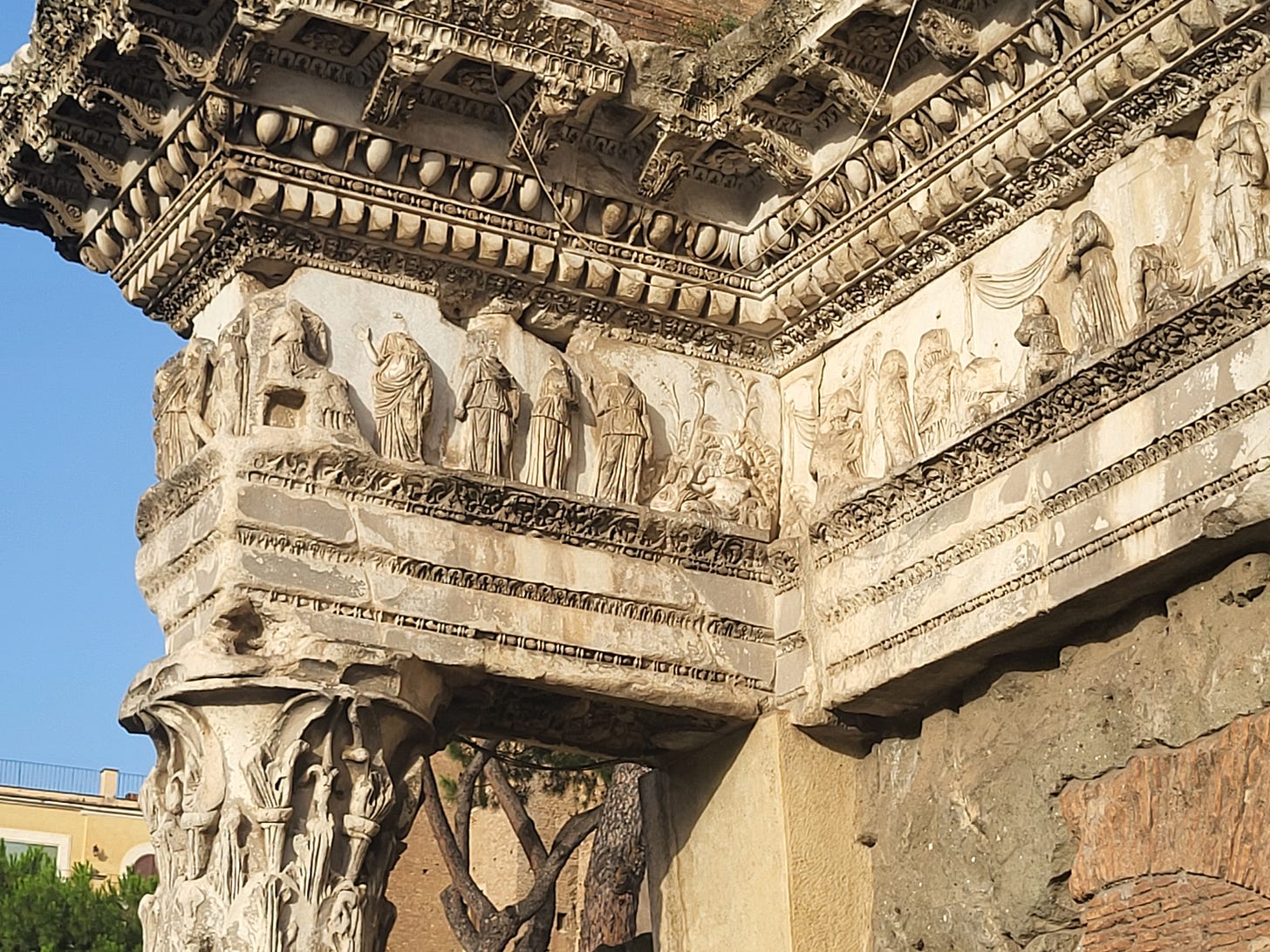why do we hate Aeneas?
I sing of a charmless man...
Okay, maybe not everyone hates Aeneas. But reading the Aeneid in college would give you a different impression.
The Aeneid was written several centuries after the Iliad, by the Roman poet Virgil. Rome was emerging from the aftershock of multiple civil wars with a brave new leader Augustus Caesar (the nephew/adopted son of Julius). Augustus claimed he had ushered in a new Golden Age of Rome with peace and god-fearing virtue. He had to maintain his political authority while avoiding looking like a king. At the same time, Julius Caesar claimed to be descended from Aeneas, and thus so did Augustus.
Aeneas is a prince of Troy who fights against the Greeks in the Trojan War. He is the son of Aphrodite/Venus, and cousins with Troy’s best fighter, prince Hector. As such, he is a minor player in the Iliad. The Aeneid details how he escaped after the Greeks sacked Troy, and sailed to Italy where he fought to establish the family that would one day give us the twins Romulus and Remus and thus, Rome. In his travels he is aided by his mother Venus, and obstructed by the queen goddess Juno.
Virgil begins the poem with “I sing of arms and a man”. Now Latin doesn’t really have indefinite or definite articles (sort of), so it’s unclear if he meant ‘a man’ or ‘the man’ but Aeneas does embody a type of ‘everyman’ figure. This opening line cleaves together the opening lines of the Iliad and the Odyssey.
Line one of the Aeneid:
I sing of arms and a man
arma virumque cano
Line one of the Iliad (transl. Lattimore):
Sing, goddess, the anger of Peleus’ son Achilleus
μῆνιν ἄειδε θεὰ Πηληϊάδεω Ἀχιλῆος οὐλομένην
Line one of the Odyssey (transl. Lattimore):
Tell me, Muse, of the man of many ways
ἄνδρα μοι ἔννεπε, μοῦσα, πολύτροπον
When I ask my friends about their hatred of Aeneas they say at least one of the following: he doesn’t really do anything; he has no personality; he left Creusa and Dido (!). I flicked through my copy of the Aeneid and found some of my past annotations that echoed these feelings. One was quoting my friend saying “Aeneas is a nepo baby”.
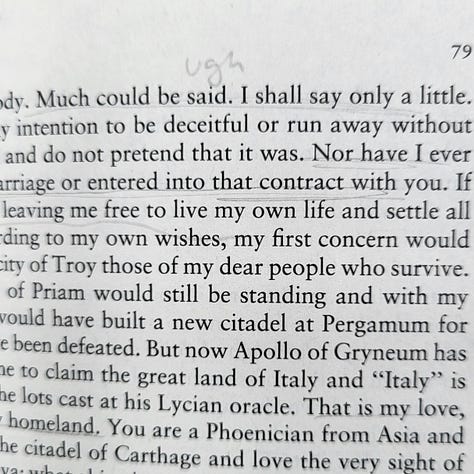
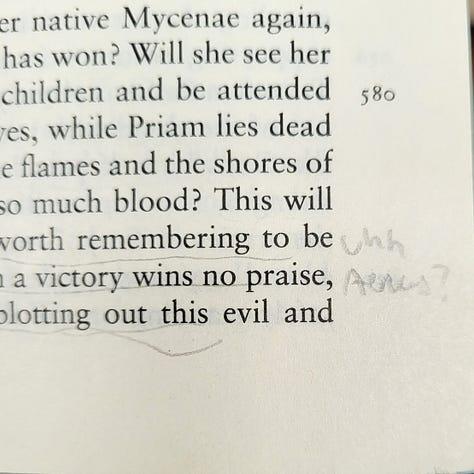
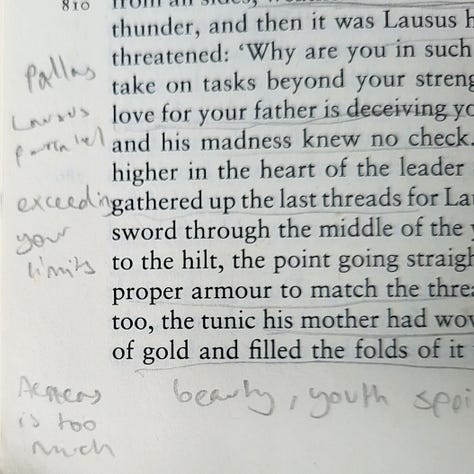
Is this true? Aeneas mostly follows the direction of the divine. He listens to Hector’s ghost who urges him to leave Troy as it is besieged. As he’s at the gates it’s the ghost of his now-dead wife Creusa who tells him of his mission to lead the Trojans to Italy. Aeneas was escaping Troy with Creusa, their son Ascanius, and his father Anchises, but lost Creusa in the fray, choosing to not return to look for her. The nepo baby accusation comes from how his mother Venus helps him throughout the epic both with his knowledge and covertly. She makes the Carthaginian queen Dido fall in fatal love with him, and once again he leaves her when Hermes reminds him to go find Italy. When he sees her again in the Underworld he claims that he didn’t have a choice to leave her - a weak excuse for any audience.
Not all of these traits are unique to Aeneas. Achilles and Odysseus are both aided by the goddesses Thetis and Athena respectively, with Thetis also being Achilles’ mother. Achilles leaves behind his soldiers on the battlefield to sulk, and Odysseus decides to delay himself on Circe’s island for a full year. However, they express their emotions much more than Aeneas, sobbing and wailing for much of their poems. In addition their personalities are much more defined. Achilles is strategic, stubborn and introspective. Odysseus is cunning, resourceful and charming. Aeneas is… pious. As a result, he is far less compelling than the Homeric protagonists.
Where Aeneas is led from situation to situation, Achilles and Odysseus make decisions that have far-reaching consequences. As part of his feud with Agamemnon, Achilles asks his mum Thetis to make Zeus bring the war into the Trojans’ favour, so that the Greeks would come to him begging for him to return to the battlefield. This results in mass death for those soldiers he was meant to be fighting alongside. Likewise, right before the escape. Odysseus reveals his identity to the Cyclops, who curses his crew to all die. If Odysseus had kept quiet, his men would have made it home to Ithaca. Aeneas is simply incapable of making self-centred choices.
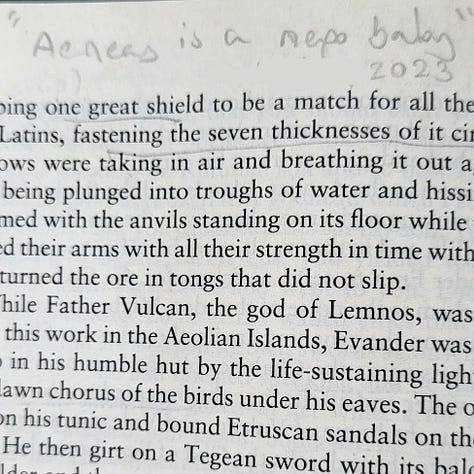
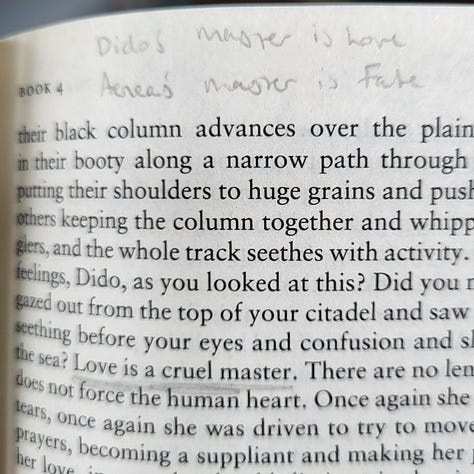
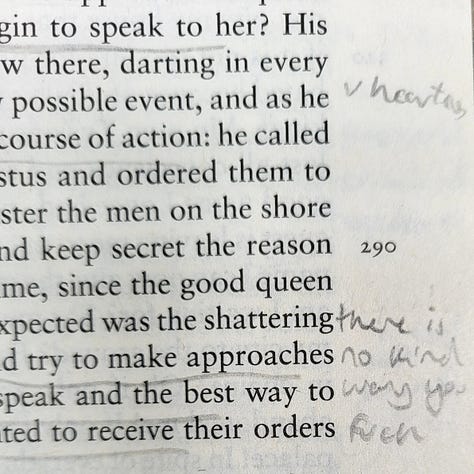
Aeneas, bless, tries to make selfish decisions but the narrative pushes him forward at every turn. He tries to fight for his home, to establish a home with Andromache in Little Troy and to stay in Carthage with Dido. Each time a god or ghost (an extension of Virgil’s pen) intervenes to keep him moving forward to Italy so that one day Virgil could compose this poem. These ‘incorrect’ decisions take place in the first half of the poem. At the halfway point, Aeneas descends to the Underworld visiting his dead father, Anchises, who reveals the significance of his descendants (Romulus, Julius Caesar, Augustus etc.). To cap off this propagandistic passage Anchises tells Aeneas how to follow the way of the future Romans to make the proud submit.
With that in mind it is curious what happens when Aeneas finally arrives in Italy. King Latinus welcomes him well, and supports Aeneas marrying his daughter, Lavinia. However, Lavinia was originally engaged to Turnus, the leader of the local Rutulians. He soon declares war. Aeneas goes to another Italian king, Evander for aid. Evander sends his son, Pallas, with Aeneas to the battlefield as part of his coming-of-age. Turnus kills young Pallas in battle, inspiring Aeneas on a murderous rampage. He breaks out of his passive stoicism, and begins killing with the reckless abandon he failed to commit to at Troy. No ghosts nor gods stand in his way. Is this blind rage Aeneas fulfilling his duty of revenge to Evander for failing to protect his son? Or is it an armed man finally exerting his will?
In the final bloody lines of the poem Aeneas kills Turnus while he begs for mercy. We don’t know if that was Virgil’s intended ending since he died before the poem’s completion. Regardless, it’s in the ambiguity where we find Aeneas at his most interesting.



